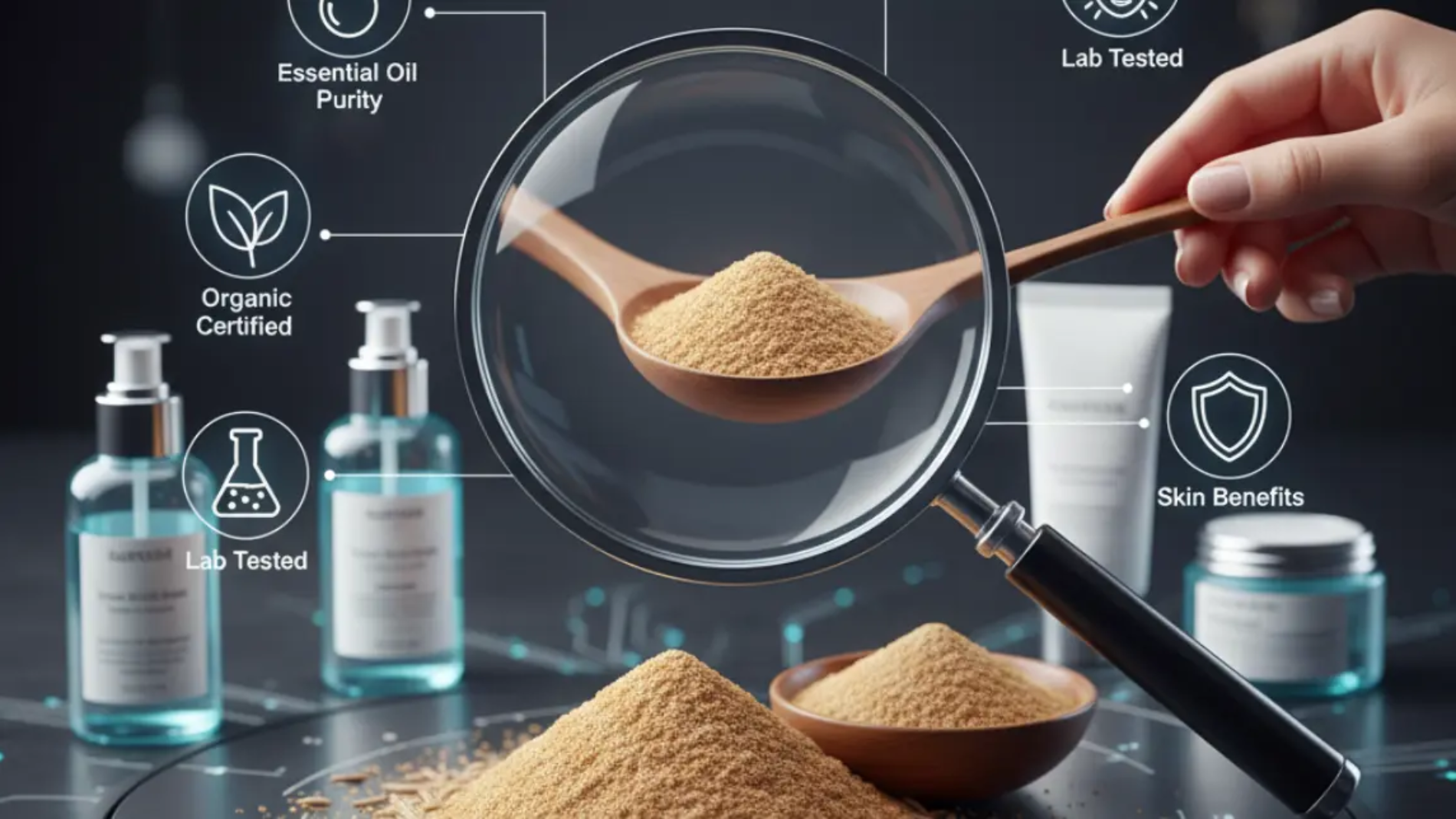The “clean beauty” revolution has fundamentally reshaped the cosmetics industry. Consumers are no longer just interested in results; they are demanding transparency, natural origins, and ingredients they can trust. This “kitchen-to-clinic” trend has led formulators to rediscover the potent benefits of ancient botanicals, and one of the most exciting emerging ingredients is cumin.
While it’s a staple in every spice rack, cumin for cosmetic use is gaining serious traction for its powerful skin-benefiting properties. But sourcing this spice for a face serum is not the same as sourcing it for a curry blend. For importers and cosmetic brands, understanding the specific quality markers of cosmetic-grade cumin is the key to creating a safe and effective product. This is your essential guide to sourcing the right raw material: the cumin seed itself.
Why Cumin? The Cosmetic Benefits Driving Demand
Formulators aren’t interested in the whole seed itself, but in the powerful compounds locked within it. These are typically extracted to create cumin seed oil or other extracts, which are then used in serums, creams, and masks. The B2B demand is growing for two key reasons:
Potent Antioxidant Properties: Cumin is a natural powerhouse of antioxidants. These compounds are the front-line defense in antioxidant skincare, helping to neutralize free radicals from pollution and UV exposure, which are the primary causes of premature aging.
Soothing & Anti-inflammatory: Cumin has well-documented anti-inflammatory properties, making it an excellent ingredient for calming irritated skin. This makes it a valuable addition to formulations targeting acne-prone or sensitive skin.
The Critical Pivot: Why the Whole Seed is Your Most Important Investment
Here is the single most important rule for sourcing: you cannot create a premium extract from an inferior raw material.
The quality of a finished cumin seed oil or extract is 100% dependent on the quality of the whole Indian cumin seed it was extracted from. Old, low-grade seeds with depleted active compounds will only produce a weak, ineffective oil. Therefore, your sourcing process must focus on securing the highest quality whole seed to serve as your foundation.
Spice Up Your Business with Authentic Indian Flavors
Import and Export Excellence from India!

A 5-Point Checklist for Sourcing Cosmetic-Grade Cumin Seeds
When sourcing cumin for cosmetic use, your specification sheet must be different from a food-grade-only spec. Here is what you must look for.
1. High and Verifiable Volatile Oil Content
For culinary use, flavour is key. For cosmetic use, potency is key. The aromatic and active compounds (like antioxidants) are found in the seed’s volatile oil. A higher volatile oil content in the seed translates directly to a more potent and effective extract for your serum.
What to do: Do not buy cumin without a guaranteed volatile oil content percentage. A quality cumin supplier will provide this on the Certificate of Analysis (COA). For cosmetic use, you should seek the highest percentage possible.
2. Guaranteed Botanical Accuracy:Cuminum cyminum
This is a critical point of confusion that can be a costly mistake. The ingredient you are looking for is Cuminum cyminum—the common, brownish-yellow cumin.
The Trap: Do not confuse this with “Black Cumin Seed”Nigella sativa, which is often used in cosmetics but is a completely different plant with a different chemical profile (its main active is Thymoquinone, not cumin-specific aldehydes).
What to do: Ensure your purchase order and your supplier’s documentation explicitly state the botanical name Cuminum cyminum to guarantee you are sourcing the correct ingredient.
3. Extreme Purity & Cleanliness (Purity Grades)
For a product that will be applied to the skin, purity is a non-negotiable safety and quality issue. The product must be free of all contaminants.
What to look for: A purity grade of 99.5% (or “Europe Grade”) is the recommended standard. This is achieved through advanced Sortex cleaning, which removes not just dust and pebbles, but also discoloured and damaged seeds.
What to demand: Your COA must verify that the product is free from pesticides, heavy metals, and aflatoxins, all of which are critical for a safe clean beauty ingredient.
4. Strict Microbiological Control
This is a key difference between food-grade and cosmetic-grade. While a certain level of bacteria is acceptable for food that will be cooked, a cosmetic product applied to the skin must be exceptionally clean.
What to do: Your supplier’s COA must include a full microbiological panel. This should show that the Total Plate Count, Yeast, and Mould are all below the strict limits required for the cosmetics industry. Sourcing sterile or “low-bacteria” cumin is a major advantage.
5. Freshness, Origin, and the COA
As mentioned, the active compounds in cumin degrade over time. Freshness is paramount.
The Origin: Indian cumin seed from the Unjha market is the global benchmark for quality. Sourcing from a supplier connected to the new harvest (which begins around February-March) ensures you receive seeds with the highest possible volatile oil content.
The COA: This document is your final proof. A reliable cumin supplier will provide a batch-specific Certificate of Analysis (COA) that verifies every spec listed above. If a supplier cannot provide this, do not buy from them.
Spice Up Your Business with Authentic Indian Flavors
Import and Export Excellence from India!

Sourcing cumin for cosmetic use is a smart, forward-thinking move that aligns with the “clean beauty” trend. But to create a product that is safe and effective, you must look beyond the spice aisle. It requires sourcing a high-potency, high-purity, and botanically accurate raw material.
It all starts with a premium, export-quality whole cumin seed.
Frequently Asked Questions (FAQs)
1. Why is cumin good for the skin?
Cumin is rich in antioxidants, which help protect the skin from free radical damage and aging. It also has natural anti-inflammatory properties that can help soothe redness and irritation, making it beneficial for acne-prone skin.
2. Is cumin seed oil the same as black cumin seed oil?
No, they are completely different. True cumin seed oil (cuminum cyminum) is what this article refers to. Black cumin seed oil (Nigella sativa) or Kalonji) is a different product with a different set of properties and is a very common point of confusion.
3. What is a good volatile oil content for cosmetic-grade cumin?
For a high-potency extract, you should look for a volatile oil content of 2.5% or higher. A premium Indian cumin seed can often exceed this, but you must verify the specification with your supplier.
4. Can’t I just use food-grade cumin for my cosmetic formula?
It is not recommended. Food-grade standards for microbiological counts (like yeast and mould) are often much looser than what is safe for a cosmetic product. You risk creating an unstable or unsafe formula.
5. Why is a COA with microbiological data so important?
A cosmetic product, especially a cream or lotion, creates an environment where bacteria, yeast, and mould can grow. Starting with a “clean” (low-microbe) raw material is the first and most critical step in ensuring your final product’s stability and safety.
6. Why should I buy whole cumin seeds instead of pre-made oil?
Buying the whole seeds gives you complete control over the extraction process. You can choose your extraction method (e.g., CO2 extraction, steam distillation) and guarantee the oil’s freshness. The oil is also more stable for longer when left inside the whole seed.
7. Is Indian cumin seed a good choice for cosmetic use?
Yes, Indian cumin seed from the Unjha region is the global benchmark for quality. A professional cumin supplier from India will be highly experienced in meeting the stringent purity and documentation requirements for export.
8. Does cumin help with acne?
Its natural anti-inflammatory and antiseptic properties make it a very popular ingredient in formulations designed to calm and clarify acne-prone skin.
About us
We bridge the gap between local producers and global markets, ensuring seamless trade facilitation with exceptional quality and reliability. We provide quick delivery services with customized packaging with all approval of International Certificates (Spices board India, MSME, IEC, fssai, FIEO, APEDA, EU certification, FDA and Many More)
Contact us
Shop No. 3, Ganesh Prestige Sr. No. 2/15, Near Laxmi Jewellers, Dhanakawadi, Pune – 411043, Maharashtra INDIA.
Call On
+91 9545205050
+91 9822422584



Leave A Comment